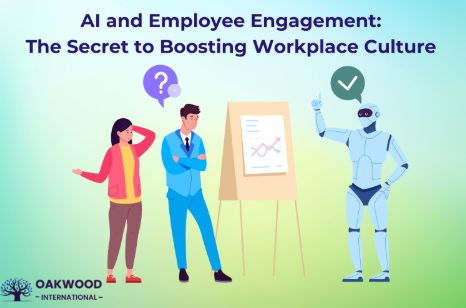A good workplace culture has always been heavily influenced by employee engagement. Any company’s success depends significantly on engaged personnel, who are more devoted, loyal, and productive than others. Being a Certified HR Manager helps you see how crucial it is to keep your employees inspired and aligned with corporate objectives.
However, given the rapid technological developments, companies today have fresh and creative approaches to make use of AI in Employee Engagement and strengthen their general working environment. Let us examine how artificial intelligence in employee engagement can provide a dynamic, driven workforce.
Table of Contents
How AI is Transforming Employee Engagement
The arrival of AI in the workplace is transforming how companies relate to staff members. Employee engagement plans from the past depended on human resources professionals monitoring performance manually and compiling feedback.
But thanks to AI-driven tools, businesses can now more successfully compile data in real-time. This helps managers guarantee employees’ constant motivation and engagement and react faster to their needs.
Tracking employee sentiment using artificial intelligence also helps identify trends in behaviour, work happiness, and potential problems. AI-powered technologies help companies better understand staff attitudes and act before minor concerns become more significant. This raises employee involvement and supports a better and more friendly workplace environment.
Personalising Employee Experiences with AI
Personalisation is one of the most effective ways artificial intelligence may increase employee engagement. To provide customised experiences that fit their particular requirements and ambitions, artificial intelligence systems can examine data about specific employees, including their interests, strengths, and work patterns.
AI-driven learning systems provide tailored training possibilities depending on an employee’s career aspirations or skill shortages, helping them advance professionally in line with their growth objectives.
Personalisation goes beyond learning and growth. AI may also customise recognition and communication to make every staff member feel valued and supported. AI may make employees feel recognised and valued by delivering tailored motivating messages or acknowledging personal milestones that are important to them, increasing their general involvement with the company.
AI-Powered Feedback and Communication Tools
Maintaining employees’ motivation and involvement depends on regular feedback. Still, getting comments can occasionally be lengthy and ineffective. Artificial intelligence has made it easier for companies to compile and evaluate comments through rapid, simple, and intelligent technologies.
AI chatbots, for example, can gather performance appraisals, pulse surveys, or even input during meetings more quickly. Tools driven by artificial intelligence also help management and staff communicate better. Companies can establish transparent channels for feedback, guaranteeing that employees feel heard and supported.
AI can even examine the feedback to identify trends or areas of concern, providing management with valuable insights to increase staff involvement and handle potential workplace conflicts. This shift towards real-time, data-driven feedback supports a culture of ongoing development.
How AI Can Drive Employee Well-being
Engagement is mostly about employee well-being. Hence, artificial intelligence allows companies to support their employees’ mental, emotional, and physical well-being. Wellness systems driven by artificial intelligence can track staff stress levels and provide customised recommendations for meditation, stress management, and healthy living.
These instruments give staff members tools to assist them in controlling their workload and preserving a good work-life balance. Artificial intelligence can help workers manage their personal and professional lives by recommending adaptable working schedules that best suit their preferences.
AI can examine an employee’s work patterns, for instance, and recommend tailored work schedules, remote working options, or even break times that support improved work-life balance and increased output. Companies may include artificial intelligence in well-being efforts to enable employees to feel more balanced, supported, and involved, hence improving retention rates and a stronger, better workplace culture.
Conclusion
AI transforms employee engagement rather than merely being a tool for boosting productivity. Adopting artificial intelligence technologies helps companies tailor employee experiences, improve feedback, enhance well-being, and create a working environment that drives long-term success. The Oakwood International training will enable individuals seeking to stay ahead of the curve to better understand artificial intelligence in employee engagement and acquire the tools to apply it successfully.
